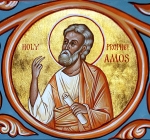
First Monday of Advent: Amos 1,2
Christians long for the second coming of Jesus, “the day of the Lord”. It will be a time of great joy for those who believe. But it will also be a terrifying day of judgment for those who do not. Jesus said, “concerning that day or that hour, no one knows, not even the angels in heaven, nor the Son, but only the Father” (Mark 13:2). He calls his followers to wait and be ready for His coming. But for many, it will be a surprise, and they will be caught living godless lives — which will result in judgment. The blatantly irreligious will be found wanting, yes … but also many who believe they’re a part of God’s inner circle.

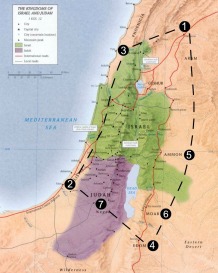 In Amos 1 and 2, the prophet foretells the judgments of eight nations. Six of them are “secular,” and two are the divided kingdoms of the people of God, Israel and Judah. In sum, they provide a litany of specific offenses that will lead to condemnation from God. Wartime tortures (1:3,13), human trafficking (1:6,9), denigrating other foreign leaders (2:1), forsaking peace accords (1:9), “forsaking pity” and staying perpetually hostile (1:11) … all for the sake of imperialistic land-grabs (1:13). All of these charges have to do with international politics.
In Amos 1 and 2, the prophet foretells the judgments of eight nations. Six of them are “secular,” and two are the divided kingdoms of the people of God, Israel and Judah. In sum, they provide a litany of specific offenses that will lead to condemnation from God. Wartime tortures (1:3,13), human trafficking (1:6,9), denigrating other foreign leaders (2:1), forsaking peace accords (1:9), “forsaking pity” and staying perpetually hostile (1:11) … all for the sake of imperialistic land-grabs (1:13). All of these charges have to do with international politics.
But then, to the (supposedly) godly nations of Judah and Israel, God brings punishments for different reasons. Here are three:
“They have rejected the law of the Lord, and not kept His statutes. Their lies have led them astray” (2:4). God had uniquely revealed Himself to the Jewish people. The words of that revelation through the law of Moses was their special gift, and also their distinctive measure. They had let this inheritance slip, and were letting the lies of their day pull them from obedience to mandates of their God. I can’t help but think that Christians today are following this same path.
“They sell the righteous for silver, and the needy for a pair of sandals” (2:6). The people of God had grown materialistic. They cared more about what they could purchase for themselves than the welfare of their neighbors, especially their poor ones. They spent more on shoes than on the poor. I can’t help but think that Christians today are following this same path.
“You made the Nazirites drink wine, and commanded the prophets, saying, ‘You shall not prophesy'” (2:12). God ordained spiritual disciplines, which helped keep the peoples sharp and attentive before God, were downplayed, and even forbidden. Had they become passe? No longer appropriate for their then-contemporary world? Too legalistic for their enlightened minds? Had they grown tired of all that talk of sin, righteousness and judgement? For whatever reason, their faith-lives had gone unpracticed and unfueled. I can’t help but think that Christians today are following this same path.
Amos’ Advent challenge to the people of God: Yes, the world is full of unspeakable evils. It’s easy to say, “Hey, I’m no terrorist.” But our plumb line is different. So, we need to let our love of God and His Word keep us from falling for the lies of our culture! We need to quit living for the promotion of our bottom lines, and be generous! We need to embrace our disciplines (e.g., be appropriately religious), and amplify Biblical truths! All the more, as we eagerly await the Lord “roaring from Zion” on that final day. May we not then be found to have lost our edge, and unconsciously drifted from God.
Stay sharp! “Prepare your minds for action, and being sober-minded, set your hope fully on the grace that will be brought to you at the revelation of Jesus Christ. As obedient children, do not be conformed to the passions of your former ignorance, but as He Who called you is holy, you also be holy in all your conduct” (1 Pet. 1:12-14).
– EO
 “The time will come,” says the Lord, “when the grain and grapes will grow faster than they can be harvested! Then the terraced vineyards on the hills of Israel will drip with sweet wine. I will bring my exiled people of Israel back from distant lands, and they will rebuild their ruined cities and live in them again. They will plant vineyards and gardens; they will eat their crops and drink their wine. I will firmly plant them there in their own land. They will never again be uprooted from the land I have given them,” says the Lord your God. – Amos 9:13-15, NLT
“The time will come,” says the Lord, “when the grain and grapes will grow faster than they can be harvested! Then the terraced vineyards on the hills of Israel will drip with sweet wine. I will bring my exiled people of Israel back from distant lands, and they will rebuild their ruined cities and live in them again. They will plant vineyards and gardens; they will eat their crops and drink their wine. I will firmly plant them there in their own land. They will never again be uprooted from the land I have given them,” says the Lord your God. – Amos 9:13-15, NLT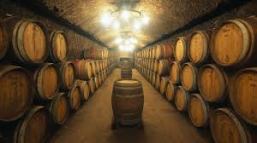 Abundant prosperity! Our God, Who says “blessed are the poor”, has great riches in store for His people when He comes again. The imagery here is fantastic – enough to excite any commodities broker to buy low, and sell high! Production so abundant that the supply chain can’t even keep up? So much wine that it will look like the hills are dripping with it? (That doesn’t sound like Genesis 3:17-19, does it?) No more let thorns infest the ground … He comes to make His blessings FLOW far as the curse is found!
Abundant prosperity! Our God, Who says “blessed are the poor”, has great riches in store for His people when He comes again. The imagery here is fantastic – enough to excite any commodities broker to buy low, and sell high! Production so abundant that the supply chain can’t even keep up? So much wine that it will look like the hills are dripping with it? (That doesn’t sound like Genesis 3:17-19, does it?) No more let thorns infest the ground … He comes to make His blessings FLOW far as the curse is found! Abundant life! I so love this picture. We’re not talking about a one-time feast (like many of our Christmas day celebrations). And we’re not talking about the consumerism-induced transience that has turned today’s believers into a bunch of frenetic church hoppers. And we’re not talking about “churches” that have become “as-long-as-the-front-door-is-bigger-than-the-back-door” retail franchises. No, God is going to “firmly plant them” in the land- what will now and forevermore be their land. Deep roots. No deracination. Never again will these aliens and strangers, these wanderers, these sojourners, have any cause or reason to leave. Home. Rest. Health. Peace.
Abundant life! I so love this picture. We’re not talking about a one-time feast (like many of our Christmas day celebrations). And we’re not talking about the consumerism-induced transience that has turned today’s believers into a bunch of frenetic church hoppers. And we’re not talking about “churches” that have become “as-long-as-the-front-door-is-bigger-than-the-back-door” retail franchises. No, God is going to “firmly plant them” in the land- what will now and forevermore be their land. Deep roots. No deracination. Never again will these aliens and strangers, these wanderers, these sojourners, have any cause or reason to leave. Home. Rest. Health. Peace. We celebrate Christmas Day on the 25th (the manger, the shepherds, the holy family). But the “thrill of hope”, why “the weary world rejoices”, is that the incarnation of Jesus on that first Christmas brought His Kingdom to bear on this world now! Through the work of the Holy Spirit, the divine cooperative has commenced. We can, now, experience abundant life, and usher others into the “foretaste of glory divine” that is life in His church! Hallowed by Thy name, now! Thy reign in the lives of your chosen people come, now! Thy will be done on earth as it is in heaven, now!
We celebrate Christmas Day on the 25th (the manger, the shepherds, the holy family). But the “thrill of hope”, why “the weary world rejoices”, is that the incarnation of Jesus on that first Christmas brought His Kingdom to bear on this world now! Through the work of the Holy Spirit, the divine cooperative has commenced. We can, now, experience abundant life, and usher others into the “foretaste of glory divine” that is life in His church! Hallowed by Thy name, now! Thy reign in the lives of your chosen people come, now! Thy will be done on earth as it is in heaven, now! May your Christmastide be rich as you enter into the feast of abundance with your wonderful savior. He has come! … and is coming again! Maranatha!, and Merry Christmas.
May your Christmastide be rich as you enter into the feast of abundance with your wonderful savior. He has come! … and is coming again! Maranatha!, and Merry Christmas. God never has, isn’t now, and never will be dealing with Israel strictly in terms of their national interests. No, since the call of Abraham, this whole “chosen-nation thing” has had everything to do with the whole planet, not just the Jews. “Go from your country and your kindred and your father’s house to the land that I will show you. And I will make of you a great nation, and I will bless you and make your name great, so that you will be a blessing. I will bless those who bless you, and him who dishonors you I will curse, and in you all the families of the earth shall be blessed” (Gen. 12:1-3). Sometimes called “The Great Commission of the Old Testament”, this call and promise encourages Abraham to rise above his ethnic and familial ties, and go on a mission that will (don’t miss this!) bless “all the families of the earth”!
God never has, isn’t now, and never will be dealing with Israel strictly in terms of their national interests. No, since the call of Abraham, this whole “chosen-nation thing” has had everything to do with the whole planet, not just the Jews. “Go from your country and your kindred and your father’s house to the land that I will show you. And I will make of you a great nation, and I will bless you and make your name great, so that you will be a blessing. I will bless those who bless you, and him who dishonors you I will curse, and in you all the families of the earth shall be blessed” (Gen. 12:1-3). Sometimes called “The Great Commission of the Old Testament”, this call and promise encourages Abraham to rise above his ethnic and familial ties, and go on a mission that will (don’t miss this!) bless “all the families of the earth”! “For behold, I will command, and shake the house of Israel among all the nations as one shakes with a sieve, but no pebble shall fall to the earth” (v. 9). God is dealing with Israel, but is not doing so privately. Their judgment is not intended to go unseen by the watching world. They are being shaken “among all the nations”. As Abraham was a blessing to Canaan … as the Israelites were a blessing to Egypt … as the Ark of the Covenant was a blessing to the house of Obed-Edom … as the people Judea would be a blessing even to Babylon, while in Exile … and, of course, as the Messiah Jesus would come to bless all mankind, they have this in common: All were shaken among the nations. God has always paraded His suffering people around the world, as a testimony of His grace and truth to all, and as a means of His blessing to the world through their sacrifice.
“For behold, I will command, and shake the house of Israel among all the nations as one shakes with a sieve, but no pebble shall fall to the earth” (v. 9). God is dealing with Israel, but is not doing so privately. Their judgment is not intended to go unseen by the watching world. They are being shaken “among all the nations”. As Abraham was a blessing to Canaan … as the Israelites were a blessing to Egypt … as the Ark of the Covenant was a blessing to the house of Obed-Edom … as the people Judea would be a blessing even to Babylon, while in Exile … and, of course, as the Messiah Jesus would come to bless all mankind, they have this in common: All were shaken among the nations. God has always paraded His suffering people around the world, as a testimony of His grace and truth to all, and as a means of His blessing to the world through their sacrifice. and inclusive than the political nation of Israel, and the ethnic clan of the Jews. It will even include “the remnant of Edom”, now “called by My name”. (Edom … remember “Jacob I loved, Esau I hated”? Here, we have Esau’s tribe being included in the new Davidic people.) Not only the Edomites, but “all the nations” who are called. Jesus’ command that the gospel be preached to the four corners of the earth displays that His Messianic Kingdom is, literally, for all the nations.
and inclusive than the political nation of Israel, and the ethnic clan of the Jews. It will even include “the remnant of Edom”, now “called by My name”. (Edom … remember “Jacob I loved, Esau I hated”? Here, we have Esau’s tribe being included in the new Davidic people.) Not only the Edomites, but “all the nations” who are called. Jesus’ command that the gospel be preached to the four corners of the earth displays that His Messianic Kingdom is, literally, for all the nations. After what we’ve been reading in Amos, v.8 is so refreshing! “‘Except that I will not utterly destroy the house of Jacob,’ declares the Lord.” God will sift His people through the sieve of His judgment, but a remnant of solid stones will remain!
After what we’ve been reading in Amos, v.8 is so refreshing! “‘Except that I will not utterly destroy the house of Jacob,’ declares the Lord.” God will sift His people through the sieve of His judgment, but a remnant of solid stones will remain!
 The past provides the plumb line for our building of our today, and our tomorrow. Our hope is firmly imbedded in our heritage. Without a keen sense of our history, we are lost. With it, we have hope.
The past provides the plumb line for our building of our today, and our tomorrow. Our hope is firmly imbedded in our heritage. Without a keen sense of our history, we are lost. With it, we have hope.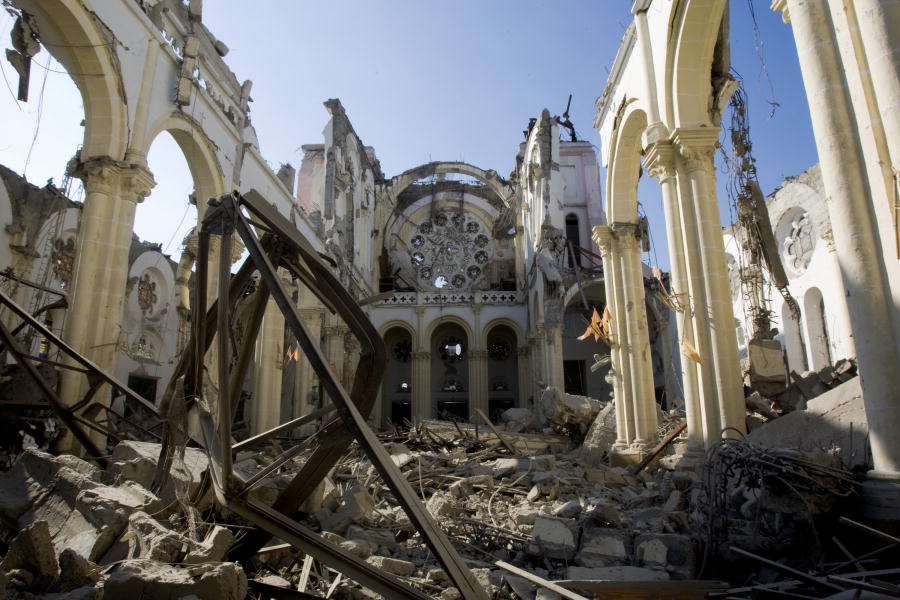 Get the picture? God is standing in the worship center, where the syncretistic, back-slidden worship has been taking place. As we have learned throughout this book, God hates it. He in essence says, “bring it down.” Those who don’t die from the building’s collapse will be slain by the sword. Such was the flood in Genesis 7. Such will be the retribution experienced by unbelievers at Jesus’ return. So sad that these think they believe – they’re actually “at church” when their destruction comes. A specter of the future?
Get the picture? God is standing in the worship center, where the syncretistic, back-slidden worship has been taking place. As we have learned throughout this book, God hates it. He in essence says, “bring it down.” Those who don’t die from the building’s collapse will be slain by the sword. Such was the flood in Genesis 7. Such will be the retribution experienced by unbelievers at Jesus’ return. So sad that these think they believe – they’re actually “at church” when their destruction comes. A specter of the future? “The Lord
“The Lord  “Are you not like the Cushites to me, O people of Israel?” declares the
“Are you not like the Cushites to me, O people of Israel?” declares the 
 We live in the Information Age. Never before have we had so much access to words. I remember the days when I got my information from libraries, encyclopedias, newspapers, the radio, and the nightly TV news. In retrospect, I knew virtually nothing about what was happening on any given day! Now, we have instant access to the whole world. We can google anything. And, with smart phones having become permanent appendages at the end of our arms, we’re never at a loss for words, and the information they carry.
We live in the Information Age. Never before have we had so much access to words. I remember the days when I got my information from libraries, encyclopedias, newspapers, the radio, and the nightly TV news. In retrospect, I knew virtually nothing about what was happening on any given day! Now, we have instant access to the whole world. We can google anything. And, with smart phones having become permanent appendages at the end of our arms, we’re never at a loss for words, and the information they carry. I find myself wanting to ramble on the ramifications of this famine … about the incredible increases of people converting to Jesus all over the world, but the acknowledged lack of teachers to disciple them … or Amos’ reference to swearing “by the Guilt of Samaria” or “As your god lives, O Dan”, which is much like our secular world choosing to swear by the truth of the scientific academic academy.
I find myself wanting to ramble on the ramifications of this famine … about the incredible increases of people converting to Jesus all over the world, but the acknowledged lack of teachers to disciple them … or Amos’ reference to swearing “by the Guilt of Samaria” or “As your god lives, O Dan”, which is much like our secular world choosing to swear by the truth of the scientific academic academy. But, are we experiencing our own personal famine of the Word? Are we spiritually anorexic? “His divine power has granted to us all things that pertain to life and godliness, through the knowledge of him who called us to his own glory and excellence, by which he has granted to us his precious and very great promises, so that through them you may become partakers of the divine nature” (2 Pet. 1:3-4). We have all of this … are we digging into it?
But, are we experiencing our own personal famine of the Word? Are we spiritually anorexic? “His divine power has granted to us all things that pertain to life and godliness, through the knowledge of him who called us to his own glory and excellence, by which he has granted to us his precious and very great promises, so that through them you may become partakers of the divine nature” (2 Pet. 1:3-4). We have all of this … are we digging into it? (As we get closer to Christmas day, all of our cultural cues are telling us to immerse ourselves in nice thoughts and cozy things. Thus, it gets harder for us to look squarely at the tough passages in Amos. Hang in there with me! It is always darkest toward the dawn. Keep your hope stretched, your longing strong, and remain an Advent disciple to the end. I truly believe it will enhance your celebration of the 12 Days of Christmastide.)
(As we get closer to Christmas day, all of our cultural cues are telling us to immerse ourselves in nice thoughts and cozy things. Thus, it gets harder for us to look squarely at the tough passages in Amos. Hang in there with me! It is always darkest toward the dawn. Keep your hope stretched, your longing strong, and remain an Advent disciple to the end. I truly believe it will enhance your celebration of the 12 Days of Christmastide.) Each week, during our church’s morning worship service, we begin with Confession and Absolution. We collectively obey the scriptures to together confess our sins, and then we receive the assurance of God’s forgiveness, according to His Word (e.g., 1 John 1:8-9). Each week, I walk through the shame of my personal valley of the shadow of death, and am taken to the green pastures of experienced grace. My soul depends on this. As the Psalmist says, “If you, O LORD, kept a record of sins, who could stand?” (Ps. 130:3). Instead, “as far as the east is from the west, so far has he removed our transgressions from us” (Ps. 130:12).
Each week, during our church’s morning worship service, we begin with Confession and Absolution. We collectively obey the scriptures to together confess our sins, and then we receive the assurance of God’s forgiveness, according to His Word (e.g., 1 John 1:8-9). Each week, I walk through the shame of my personal valley of the shadow of death, and am taken to the green pastures of experienced grace. My soul depends on this. As the Psalmist says, “If you, O LORD, kept a record of sins, who could stand?” (Ps. 130:3). Instead, “as far as the east is from the west, so far has he removed our transgressions from us” (Ps. 130:12).
 Our Father God is truly “acquainted with grief” (Is. 53:3) He chose to experience the loss of His only Son, so that our collective grief can be replaced by joy to the world. Amos boldly called the people back to God. Will we do the same? And, by doing so, go beyond the cozy Christmas glaze, and introduce the lost to the only gift that matters?
Our Father God is truly “acquainted with grief” (Is. 53:3) He chose to experience the loss of His only Son, so that our collective grief can be replaced by joy to the world. Amos boldly called the people back to God. Will we do the same? And, by doing so, go beyond the cozy Christmas glaze, and introduce the lost to the only gift that matters? I just can’t shake this one. God is incredibly angry at Israel for … well, can I just say it? For doing business like Americans have done business for years.
I just can’t shake this one. God is incredibly angry at Israel for … well, can I just say it? For doing business like Americans have done business for years. THE DODGERS?: Speaking of overpaying for value received … here in Arizona, tickets are on sale already for spring training games. For my family to go to one of these exhibition games (featuring scrubs and wannabes), it would cost $64. Plus parking. Plus, if we’d like a bite to eat. exorbitantly overpriced food. In short, well over $100. Honestly, we can’t afford that right now.
THE DODGERS?: Speaking of overpaying for value received … here in Arizona, tickets are on sale already for spring training games. For my family to go to one of these exhibition games (featuring scrubs and wannabes), it would cost $64. Plus parking. Plus, if we’d like a bite to eat. exorbitantly overpriced food. In short, well over $100. Honestly, we can’t afford that right now.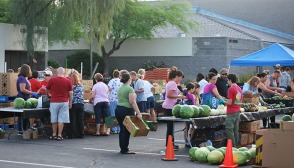
 Jesus is the Word. Christians, like the Jews, have always been people of the book. We believe that a primary way that God has communicated to people is through words, through language.
Jesus is the Word. Christians, like the Jews, have always been people of the book. We believe that a primary way that God has communicated to people is through words, through language. “This is what the Lord God showed me: behold, a basket of summer fruit. And he said, ‘Amos, what do you see?’ And I said, ‘A basket of summer fruit.’ Then the Lord said to me, ‘The end has come upon my people Israel; I will never again pass by them. The songs of the temple shall become wailings in that day,’ declares the Lord God. ‘So many dead bodies!’ ‘They are thrown everywhere!’ ‘Silence!’” (Amos 3:1-3).
“This is what the Lord God showed me: behold, a basket of summer fruit. And he said, ‘Amos, what do you see?’ And I said, ‘A basket of summer fruit.’ Then the Lord said to me, ‘The end has come upon my people Israel; I will never again pass by them. The songs of the temple shall become wailings in that day,’ declares the Lord God. ‘So many dead bodies!’ ‘They are thrown everywhere!’ ‘Silence!’” (Amos 3:1-3). Second, it affirms again how important the creative use of language is to God. The way God speaks to His prophets reinforces to me both the truth and the beauty of God, and His Word. And we, made in His image and likeness, are the only creatures on the planet who are also users of language. What we say, and how we say it, are of enormous importance! We don’t just deal in “truth”. We deal in divine-image communication, which should be handled with great care, and for the most noble purposes.
Second, it affirms again how important the creative use of language is to God. The way God speaks to His prophets reinforces to me both the truth and the beauty of God, and His Word. And we, made in His image and likeness, are the only creatures on the planet who are also users of language. What we say, and how we say it, are of enormous importance! We don’t just deal in “truth”. We deal in divine-image communication, which should be handled with great care, and for the most noble purposes. God shows Amos that he is “setting a plumb line in the midst” of the people. And it’s clear that the people won’t measure up. Destruction is imminent … but where will it be centered? “The high places”, “the sanctuaries”, that’s where (v. 9).
God shows Amos that he is “setting a plumb line in the midst” of the people. And it’s clear that the people won’t measure up. Destruction is imminent … but where will it be centered? “The high places”, “the sanctuaries”, that’s where (v. 9). In today’s text, the high priest Amaziah has had enough of Amos. Amaziah is the leader of the worship program at Bethel – a brand of worship enjoyed by the wealthy Samarians, which incorporates some of the most attractive, diverse, intercultural elements of the neighboring religions. This bumpkin Amos has already declared Bethel’s worship offensive to the very God it claims to honor. Now, he has the gall to say that the sanctuary building will actually be ruined? Who would say such a thing about a fine, successful, religious man, his organization, his services, and his facility? So, Amaziah rallies the political support of the King, and then tells Amos to go home to Judah, and never return*.
In today’s text, the high priest Amaziah has had enough of Amos. Amaziah is the leader of the worship program at Bethel – a brand of worship enjoyed by the wealthy Samarians, which incorporates some of the most attractive, diverse, intercultural elements of the neighboring religions. This bumpkin Amos has already declared Bethel’s worship offensive to the very God it claims to honor. Now, he has the gall to say that the sanctuary building will actually be ruined? Who would say such a thing about a fine, successful, religious man, his organization, his services, and his facility? So, Amaziah rallies the political support of the King, and then tells Amos to go home to Judah, and never return*. It is almost impossible to speak prophetic correction into someone’s worship experience: there is so much self there. Worship can be very emotional. The use of the arts helps us express that emotion. When it comes to one’s heart and art, it gets very subjective, very personal. To say to someone “your worship is wrong” can, and does, elicit a violent reaction.
It is almost impossible to speak prophetic correction into someone’s worship experience: there is so much self there. Worship can be very emotional. The use of the arts helps us express that emotion. When it comes to one’s heart and art, it gets very subjective, very personal. To say to someone “your worship is wrong” can, and does, elicit a violent reaction. Because we need it! We need a plumb line for our worship more than ever. Because, like lemmings to the sea, our contemporary church has let the influences of our secular culture not only infect, but even set the agenda for our gatherings. They are now far less for God, and far more for people – often for unbelieving people. We do this in the name of “evangelism”, which is often simply a pseudo-spiritual redefinition of business development and procuring market share. Most church leaders have given little-to-no thought about the actual divine prescriptions for their people’s worship. Oh, that Amos would come to us today … and that we would not just send him away, but would hear his voice, repent, and do what is needed to be found pleasing Him in our worship when He returns!
Because we need it! We need a plumb line for our worship more than ever. Because, like lemmings to the sea, our contemporary church has let the influences of our secular culture not only infect, but even set the agenda for our gatherings. They are now far less for God, and far more for people – often for unbelieving people. We do this in the name of “evangelism”, which is often simply a pseudo-spiritual redefinition of business development and procuring market share. Most church leaders have given little-to-no thought about the actual divine prescriptions for their people’s worship. Oh, that Amos would come to us today … and that we would not just send him away, but would hear his voice, repent, and do what is needed to be found pleasing Him in our worship when He returns!